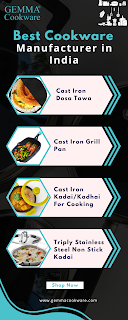The Ultimate Guide to Cast Iron Cookware
In the world of culinary craftsmanship, few items stand the test of time like cast iron cookware. Cast iron pans, also known as cast iron skillets, dutch ovens, and more, are not just kitchen tools; they are the embodiment of tradition, versatility, and durability. In this comprehensive guide, we explore the world of Cast Iron Cookware, diving into the various types, maintenance tips, and the undeniable charm of cast iron that has made it a timeless classic in the culinary realm.
What is Cast Iron Cookware?
Cast Iron is a type of cookware made by casting iron into a
mold to create a solid, heavy-duty pan or pot. It's known for its exceptional
heat retention, even heating, and unmatched durability. Cast iron cookware is
versatile, allowing you to use it on stovetops, in ovens, over open fires, or
even on grills. It's the ultimate choice for those who love to sear, roast,
fry, and bake.
Types of Cast Iron Cookware
1. Cast Iron Pan
The Cast Iron Pan is perhaps the most iconic and versatile
piece of cast iron cookware. It's a kitchen workhorse, perfect for searing
steaks, frying eggs, and even baking cornbread. The more you use it, the better
it gets. Seasoned with layers of oil and time, cast iron pans develop a natural
non-stick surface.
2. Dutch Oven
Dutch ovens are a must-have for anyone serious about
slow-cooking. Their thick walls and tight-fitting lids are ideal for simmering
stews, baking bread, and creating mouthwatering roasts. They come in various
sizes and have a place both on the stovetop and in the oven.
3. Dosa Tawa Non Stick
The Dosa Tawa Non Stick is a specialized piece of cast iron
cookware, designed for creating the perfect Indian dosa. Its flat surface
ensures even heating, Cast Iron Pan making it the ideal tool
for crafting those thin, crispy pancakes.
The Beauty of Cast Iron
Cast iron cookware offers more than just excellent heat
distribution and durability. Here are some additional benefits:
1. Natural Non-Stick
With proper seasoning and care, cast iron develops a natural
non-stick surface, which means you can cook with less oil and enjoy healthier
meals.
2. Longevity
Cast iron cookware can last for generations. With the right
care, it becomes an heirloom piece that you can pass down to your children and
grandchildren.
3. Iron Enriched Food
Cooking with cast iron can increase the iron content of your food, making it an excellent choice for individuals with iron deficiencies.
4. Versatility
From searing a steak to baking a pie, cast iron cookware can
handle it all. Its ability to go from stovetop to oven makes it incredibly
versatile.
Caring for Your Cast Iron Cookware
Maintaining your cast iron cookware is crucial for ensuring
it stands the test of time. Here are some essential tips:
Seasoning: Regularly season your cast iron cookware by
applying a thin layer of oil and heating it until it smokes. Cast Iron This process prevents rust and
maintains the non-stick surface.
Cleaning: Avoid using harsh detergents or scrubbing with
abrasive materials. Instead, clean with hot water and a soft brush or sponge.
Drying: Always ensure your cast iron is completely dry to
prevent rust. You can heat it on the stovetop to evaporate any remaining
moisture.
Storage: Store your cast iron cookware with a paper towel or
cloth between the pieces to prevent moisture buildup.
In Conclusion
Cast Iron Cookware represents a timeless, versatile, and
reliable choice for any home chef. From searing to slow-cooking, it can do it
all. With proper care and a bit of seasoning, it will become an indispensable
part of your culinary journey. So, whether you're a seasoned chef or just
starting in the kitchen, consider investing in cast iron cookware to enhance
your cooking experience.


Comments
Post a Comment